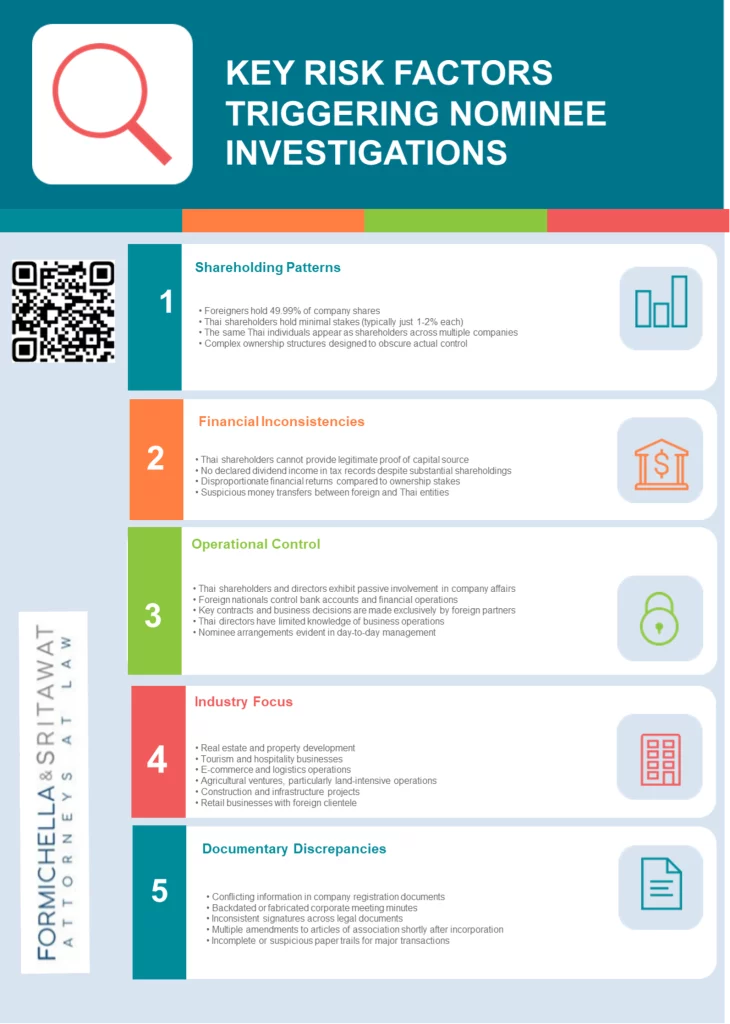Posted by Dr. Paul Crosio, Nannapat Sritas on
Thai authorities are executing their most aggressive campaign to date against illegal nominee structures used to bypass the Foreign Business Act (FBA). This multi-agency enforcement effort, widely reported by outlets such as the Bangkok Post, leverages powerful new data integration tools and legal reforms, fundamentally altering the risk landscape for non-compliant foreign investment.
The Enforcement Arsenal: Technology and Targeted Action
The cornerstone of the crackdown is the real-time data integration between the Department of Business Development (DBD) and the Revenue Department. This system cross-references corporate filings (shareholder lists, directors, and capital) with tax records, exposing financial inconsistencies that signal the use of nominees. Key red flags include Thai shareholders lacking proof of capital sources, absence of proportionate dividend income, or disguised management fees paid to foreigners.
Enforcement is highly targeted. Over 46,918 entities in high-risk sectors – notably real estate (Phuket, Bangkok, and other hotspots), tourism, e-commerce/logistics, agriculture, and construction – are expected to face inspections in 2025. Authorities now conduct unannounced site visits and interview Thai shareholders to verify their genuine understanding of the business and financial involvement. Passivity or ignorance is a critical red flag, reinforcing the judiciary’s “substance over form” doctrine, as established in precedents such as Supreme Court Decision No. 2975/2547.
Penalties are escalating severely.
Proposed amendments to the Anti-Money Laundering Act (AMLA) aim to classify serious FBA violations as predicate offenses for money laundering. This empowers the Anti-Money Laundering Office (AMLO) to freeze or seize assets (including land, buildings, and accounts) acquired through illegal nominees. This drastic step compounds existing FBA penalties: criminal charges (up to 3 years imprisonment, fines up to 1 million THB per violation under Sections 36/37), company dissolution, deportation, and blacklisting.
Table 1: Key Risk Factors Triggering Investigations
| Category | Specific Red Flags |
| Shareholding Patterns | Foreigners hold 49.99%; Thai shareholders hold minimal stakes (e.g., 1-2% each); the same Thai shareholders own multiple companies. |
| Financial Inconsistencies | Thai shareholders lack proof of capital source; no declared dividend income in tax records commensurate with shareholding. |
| Operational Control | Thai shareholders/directors are passive; foreigners control bank accounts, contracts, and key decisions. |
| Industry Focus | Real estate, tourism/hospitality, e-commerce/logistics, agriculture, construction. |
Regulatory Shifts & Legal Foundations
This crackdown coincides with significant regulatory changes. While recent FBA amendments aim to liberalize some sectors, the government operates on a “clean-up before liberalization” principle. Eliminating illegal shadow structures is a prerequisite for any future, more open investment regime, ensuring transparency within revised legal frameworks.
Thailand’s bid for OECD membership intensifies pressure. Its poor ranking on the OECD FDI Regulatory Restrictiveness Index (FDIRRI) necessitates demonstrably effective enforcement against circumvention, like nominees, to prove a transparent market. Thai courts consistently uphold the illegality of structures that mask foreign control, focusing on actual control and funding source, regardless of paperwork compliance – a principle solidified in rulings like the 2024 Phuket nominee case, which resulted in criminal convictions.
Digital Transformation as an Enforcement Tool
The mandatory DBD Biz Regist platform is central to compliance enforcement. It creates a centralized digital footprint for every company, recording structures, shareholders, directors, and capital. This database enables seamless cross-verification with Revenue Department tax filings. Authorities use algorithms to flag high-risk patterns (e.g., multiple companies using the same passive Thai shareholders) for immediate investigation. This digital shift also supports Thailand’s World Bank B-READY assessment goals while making circumvention harder.
Compliance Pathways: Legitimate Strategies Only
The heightened risks make abandoning existing nominee models immediate and imperative. The potential consequences – criminal prosecution, asset seizure, dissolution, deportation – are catastrophic. Foreign investors must proactively adopt legitimate structures:
- Board of Investment (BOI) Promotion: Offers the most significant benefits, including 100% foreign ownership, tax incentives, work permit facilitation, and land ownership rights for eligible projects in promoted sectors (e.g., tech, advanced manufacturing). Requires demonstrating substantial investment, technology transfer, and job creation.
- Foreign Business License (FBL): Essential for activities under FBA Lists 2 (national security/arts/resources) and 3 (services). Allows foreign ownership above standard thresholds (up to 60% for List 2, above 49.99% for List 3). Applications require proof of significant capital (minimum 3 million THB, often significantly higher), technology transfer, job creation for Thais, and economic benefits. Expect rigorous scrutiny and lengthy approval.
- Treaty Protections: The US-Thai Amity Treaty allows qualifying US investors to hold majority or 100% ownership in many (but not all) FBA-restricted sectors without an FBL. Eligibility and sector coverage require careful legal verification.
- Genuine Thai Partnerships: If Thai equity is mandated, partner only with active, credible Thai investors contributing real capital, expertise, or assets. Ensure profit-sharing aligns transparently with genuine ownership and conduct thorough due diligence. Formalize all agreements meticulously.
- Industrial Estate Authority of Thailand (IEAT): Operating within promoted IEAT zones can offer specific FBA exemptions and other incentives.
Real Estate-Specific Compliance
Legal alternatives are essential:
· Leases: Up to 30 years.
· Usufructs/Superficies: Rights to use/derive profit from land or own buildings on leased land.
· Condominium Freehold: Purchase within the foreign quota (typically 49% of a project’s unit area).
Crucially, using a Thai nominee company to hold land is now considered exceptionally high-risk and strongly discouraged. Utilizing DBD Biz Regist with complete accuracy and transparency is a critical first line of defense, providing verifiable proof of legitimate structures.
Table 2: Thailand’s Foreign Business Act Framework & Compliance Pathways
| FBA List/Exemption | Description | Foreign Limit | Key Approval |
| List 1 | Prohibited (e.g., media, rice farming, land trading) | 0% | Prohibited |
| List 2 | Security/Arts/Resources (e.g., transport, mining) | Max 60% (Min Thai 40%) | FBL + Cabinet Approval |
| List 3 | Services “Thai-not-ready” (e.g., legal, retail) | Max 49.99% (without license) | FBL + Foreign Business Committee |
| Exemptions | BOI, IEAT, Treaties (e.g., US Amity) | Up to 100% | BOI Certificate / IEAT Permit / Treaty Benefit |
Legitimacy is Non-Negotiable
Thailand’s integrated data systems, severe penalties, and judicial backing make illegal nominee structures unsustainable. The dual strategy of rigorous enforcement and digital transparency aims to channel foreign investment into legitimate pathways, such as BOI promotion and FBLs. While compliance complexity has increased, meticulous adherence to the FBA, leveraging legal exemptions, and maintaining complete transparency are now fundamental for sustainable operation in Thailand. Businesses relying on nominees face urgent operational and legal jeopardy; comprehensive restructuring is essential for survival. Thailand’s future as an investment destination depends on striking a balance between openness and robust, technology-driven enforcement of its foreign ownership laws.




